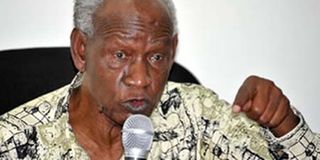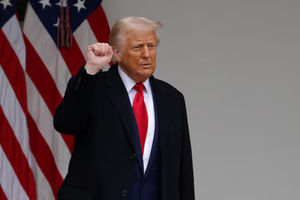It’s tough going for Katiba team

What you need to know:
- Public opinion is deeply divided over the structure that would best promote harmony and prosperity, he said here yesterday.
Zanzibar. The Katiba team faces an uphill task handling the proposed structure of the union, according to the Chairman of the Constitution Review Commission (CRC) Judge (rtd) Joseph Warioba (pictured).
Public opinion is deeply divided over the structure that would best promote harmony and prosperity, he said here yesterday.
Judge Warioba’s remarks come against a backdrop of allegations that some political parties have infiltrated the system and are pushing their agenda vis-a-vis the union system.
Mr Warioba warned early this month against any form of manipulation, especially from political leaders, many of whom are said to have set their sights on influencing views coming out of the assemblies.
He told politicians to keep off meetings. The assembly meetings kicked off on July 12 and will run up to September 2.
The first draft constitution that was unveiled in June proposes a three-tier government, but it sparked off an intense public debate after the ruling Chama Cha Mapinduzi (CCM) and the main opposition Chadema came up with different positions.
While CCM is for two forms of government, Chadema supports Mr Warioba’s proposal and has accused its rival of infiltrating the constitution fora to push for its interests.
Addressing the Zanzibar municipal constitutional forum yesterday, Judge Warioba said the work ahead was tough. He added: “Some people support proposals in the first draft constitution on three governments. Some want the present two to be upheld while others want even four. Others want a treaty-based union. I have witnessed different opinions even here. This is going to be a challenge.” He advised contributors to peg their views on valid arguments. He added: “I have said before and I am repeating it here, unless the opinion is valid we are not going to take it on board.”
Meanwhile, members of the Zanzibar municipal constitutional forum overwhelmingly rejected the three-tier government format and called for the status quo to be maintained. The few who held different opinions were booed and the forum chairperson and CRC commissioner, Mr Awadh Ally Said, had to come to their rescue. Every member had the right to speak and be heard, he said.
The majority said a third government was not good for political tranquility in Zanzibar and the unity of the nation.
The members suggested that if contentious union issues, popularly referred to as kero za muungano, were the logic behind a federal government, then the solution would be to find a constitutional way to solve the problems rather than adopt a third government. Pili Ally Seif said: “It is indeed true that most of the contentions come from Zanzibaris. That doesn’t mean we don’t want this union. We need this union as much as we need fair representation and share from it.”
The cost of running the third government would be enormous, they said, and it would be unrealistic to expect Zanzibar to make an equal contribution. “The total budget of Zanzibar for this year is around Sh600 billion, while the budget passed for ministry of Defence--which is a union ministry--is over a trillion shillings,” said Mr Othman Ramadhan Suleiman. “Even if we wanted to contribute, the sad reality is that we can’t.”
Some members argued that the three-government proposal is a backhanded way to break the union, “If we will all have our respective governments, then talk of sovereignty will surpass the rationale of having a union,” said Mpita Kassim Taratibu. “If we break the union, God forbid, Zanzibar stands to lose more. All the deep-rooted political rivalry will tear the country apart and those who have settled on the mainland will be forced to leave and lose their investments.”
Recommendations coming out of the proposals will be included in the second draft of the proposed Constitution to be presented to the National Constitutional Assembly.




